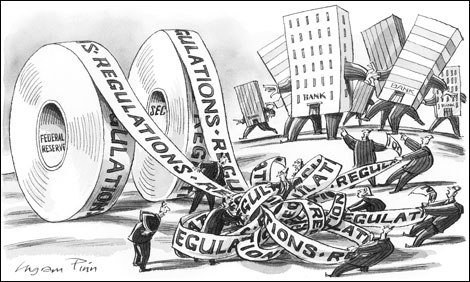Countries That Incentivize And Deregulate Crypto Startups Will Reap The Rewards If The Technology Goes Mainstream

In economics there is one action a government can take that is king when it comes to other options, to incentivize desirable behaviors. For example, want more farmers to grow bananas? Lower the taxes farmers pay when they sell bananas and it will suddenly bananas become more profitable than other plants to grow. This is a simplistic idea, but it is also a powerful one when talking about how a country can foster new technology that is potentially world changing, as an early stage. As of now however very few large countries are choosing to incentivize crypto startups, but rather heavily regulate them, which will cause them to lose out on large sums of potential revenue.
How America’s Incentivization Has Historically Provided Economic Wellbeing
Historically America has made itself competitive by incentivizing new technology, which is why for a long time and today still is the hub for many industries. Silicon Valley for example is a direct result of the Us ignoring phone company’s pleas to regulate the internet and instead letting it grow unregulated. The US incentivized internet startups and as a direct result the US tech industry employs 6.5 million people and accounts for 7.1% of the GDP. America is a great example because in the past almost every made in America technological product was a result of the government either incentivizing the new fields or leaving them alone unregulated.

Automobile manufacturing in the United States is another great example of how lack of regulation allowed a new and life changing technology to prosper. Andreas Aantonopolous talks about this in many of his talks, but at the time of the automobile creation, England had a much better infrastructure for creating them and if they had allowed the industry to prosper there, Ford might have not been anywhere as successful as it was. Instead England decided to heavily regulate the automobile industry which killed the demand for the automobiles and made it impossible to work on improving the technology. One such example is the red flag act where 3 people had to be present to operate an automobile, a machinist/repairman if something were to go wrong and the car broke down, a vehicle operator and a person who would walk in front of the car and wave a red flag to warn civilians in the area of the incoming death machine. America chose to do the opposite and for many years the automobile industry was part of the backbone of the American economy. When England finally decided to allow the industry to prosper their tech was 20 years behind, and the rest is history.
State Of Current Regulation
Obviously to many of those who follow the news regarding crypto startups and how they treat the currencies, the United States no longer deems it a smart idea to incentivize growth industries. Despite the fact that Silicon Valley is pumping billions into fintech, new companies still have to apply for licenses state by state, which cost hefty sums of money and time. Starting a crypto startup in America and making it as efficient as possible without millions in backing to get through just regulation is impossible. If changes aren’t made and quickly, the crypto revolution will happen elsewhere, and I completely expect it to.

America today is so focused on breaching privacy, Know your customer laws and Anti money laundering laws, that it is killing the industry before it can even take off. Most startups in the internet days happened with people who had a good idea in their basements and decided to pursue them without any backing. That dream in America is dead.
So now we look for other countries in the world who would be willing to provide the incentives that crypto technology needs to grow, but many, because of a monopoly on money and forfeiture of privacy, are coming to the same conclusions as America. We have the historical evidence that incentivization works, so why throw away potentially a trillion dollar business worth of tax revenue for nothing?
What Countries Need To Do Now To Ensure Growth
If a country wanted to choose the most effective method to best foster crypto technology, today, there are a few steps which must be taken. The first would be to abandon current regulation that applies to banks, but that is also currently being applied to crypto currency startups. Countries like the US are trying to fit a round block into a triangle hole with current regulation. Cryptocurrencies aren’t like anything we have seen before, so applying existing regulation to them is pointless and hurting the industry. Instead governments need to deregulate startups for a period of time while they mature and develop. Current regulations require startups have millions just to operate within the law and you will never be able to develop a fledgling industry that way.

Next , governments should allow a grace period of tax free growth on startup expenses and salaries in order to attract the best talent to the industry. Ultimately tax free stipulations while the companies are growing will allow them to create a better base infrastructure and also help to build layers on top of protocols and developing the entire industry as a whole.
Finally the last thing governments need to do is ignore competitive lobbying and attacks against the cryptocurrency industry. Right now governments are taking too much advice from banks and other competitors who are making baseless claims. Especially in the US we are seeing the massive banking and credit sectors take a stance against bitcoin. If America had listened to AT&T and other phone companies who lobbied against the internet at the time, America would not have captured the size of the tech market that it has today.
Overall, cryptocurrencies are a new technology that needs to be allowed to grow without any interference from governments if they wish to receive the largest benefit in the long run. Startups should be able to be run in a basement with a few people, without having to comply with the same regulations as billion dollar banks. Countries who make these changes and foster long term growth of the technology will gain the largest benefits, that come with prosperity and numerous jobs.
-Calaber24p
Wholly agree. So far switzerland seems to be the best place (especially when it comes to smart contracts and people)
Downvoting a post can decrease pending rewards and make it less visible. Common reasons:
Submit
Ill have to look into Switzerland more, I knew there were some things going on there, just not 100% sure what. But it wouldnt surprise me, Switzerland has always been on the cusp of fintech.
Downvoting a post can decrease pending rewards and make it less visible. Common reasons:
Submit
Very insightful. Can't wait to see what this looks like In a few years!
Downvoting a post can decrease pending rewards and make it less visible. Common reasons:
Submit
Great post @calaber24p, great post. It is not "if the technology goes mainstream", it is when, because it will happen. The big players are already putting structures in place to explore the uses of the blockchain technology. In looking at the largest collection of bitcoins per individual per country, Chinese are the largest collectors of bitcoins as we speak. Little wonder China has decided to lead from the front leaving countries like the US and UK behind, still at the starting block. They already have a working group set up to fast-forward the development and adoption of the blockchain technology and also proposing laws that will allow the citizens to own digital currencies. You can check out an article I posted a few weeks ago @ https://steemit.com/bitcoin/@delphia16/how-using-the-blockchain-cryptography-can-tame-the-lion-of-corruption-even-in-developing-nations
The United Arab Emirate (UAE) is exploring how to use the technology to stop the flow of "Blood Diamonds" from different nations. Australia has just set up a structure to explore the use of the blockchain technology in accurate election voting and many more. You can also check out this other article I posted relating to the above @ https://steemit.com/money/@delphia16/for-the-blockchain-technology-the-world-is-falling-in-line-and-about-time-too .
So you see, it is not if, it is just a matter of time. But those that jump on it first, get to milk the cow and have a greater advantage of reaping more of the benefits to come.
Downvoting a post can decrease pending rewards and make it less visible. Common reasons:
Submit
I never take anything as a definite, just because I honestly think anything could happen. Plus when im talking about cryptocurrency im talking about mainly open public distributed ledgers, which I think do have a potential to become less mainstream than private blockchains. This is an unpopular opinion that many don't share with me, but people using private blockchains many times can do it cheaper and the tech has to just be good enough. It is far more inferior than open public blockchains, but they will still find a place. Im just hoping that big companies don't accept them as the standard.
Downvoting a post can decrease pending rewards and make it less visible. Common reasons:
Submit
Noted! Great post though. Thanks for sharing.
Downvoting a post can decrease pending rewards and make it less visible. Common reasons:
Submit
Great post. It would be cool if you could find the time and resources to compare a few key countries in terms of cryptobusiness-friendliness...
Downvoting a post can decrease pending rewards and make it less visible. Common reasons:
Submit
Canada has been pretty open armed towards bitcoin, the Isle of Mann has as well, its hard with many of the other countries because they seem to flip flop a lot and there is a large amount of disagreement among different government agencies and states.
Downvoting a post can decrease pending rewards and make it less visible. Common reasons:
Submit
Good article it is pleasant to read!
Downvoting a post can decrease pending rewards and make it less visible. Common reasons:
Submit
Great post with great info, thank you!
Downvoting a post can decrease pending rewards and make it less visible. Common reasons:
Submit
Great post! It's sad when you understand that the same politicians who preaches liberalism in some sectors are really closed to this idea when traditional banks interest are in check.
Downvoting a post can decrease pending rewards and make it less visible. Common reasons:
Submit
Gotta get those donations for your future campaign :)
Downvoting a post can decrease pending rewards and make it less visible. Common reasons:
Submit
Bitcoins sind eintoller weg und anreitz für viele anonym geld zu verdienen tolle sache
Downvoting a post can decrease pending rewards and make it less visible. Common reasons:
Submit
A great piece, thanks
Downvoting a post can decrease pending rewards and make it less visible. Common reasons:
Submit
The Best thing that the government can do economically is NOTHING. Just get the hell out of the way. Don't subsidize, don't regulate, don't tax. Just get the HELL out of the way. The only reason we need government is to Protect the Border and the courts. Keep government small, tiny and starving and let the economy grow.
Downvoting a post can decrease pending rewards and make it less visible. Common reasons:
Submit